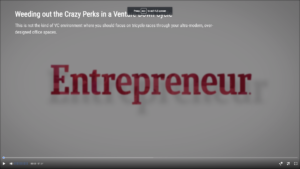Originally published in Entrepreneur Magazine
By Phil Wickham
Click below to watch the Video
I like to garden, and as someone who has been through a number of boom-and-bust cycles in technology, it often occurs to me while I’m digging in the dirt how much venture-capital market dynamics match the patterns found in developmental biology.
I’m quite serious about this.
To explain: One house on our street has soil where Thai basil flourishes; but at our house, we can’t get that particular herb to grow at all. You never know, based on soil, sun and surroundings, what’s going to take root, and gardening becomes a process of discovery.
Some things will really take off, but then collapse under their own weight. Yet while you’re waiting to see what works, importantly you need to continue pulling out the weeds or they suck the nutrients out of the soil that your desirable plants need.
And that’s a kind of metaphor for where we are right now, in the venture space. Yes, it’s a time of capital constraint, but constraint is actually a very healthy and natural process.
It’s a time of pruning back and pulling out the weeds so that the most successful and strongest contenders can soak up the nutrients and water and sunlight.
When we see stories about companies that are cutting back on their free fitness centers, laundry services or scratch-and-sniff wallpapers — or the lavish wine parties of which you’ve doubtless heard — you realize that those perks were probably signals of weak ideas or weak teams. Perhaps those companies shouldn’t make it to the exits.
And if these perks describe your startup, perhaps you’ve been in error spending your funding on lavish trappings. You weren’t focused on the right things.
Instead, the best talent is typically attracted not by perks but by a solid challenge and an even more solid team working on it.
Perks are not the only problem: Another signal of trouble is if you hear that people at your venture-backed startup are pulling back on hours because things are getting tough.
If you are employed at a venture-backed startup, and right now people are talking about work-life balance, you might want to start job hunting. Your company may not be around for very long.
The best founders and teams know better. They don’t pull back when things get tough. Yes, they are scared sh–less. This is survival of the fittest, after all: They are there until 9 or 10 p.m. at night. They are watching their cash flow. They are squirreling away nuts for the winter and they are going to tough it out.
But they also understand that when financial capital is constrained, human and market talent frees up. This is when winners are created.
The way of the world now is that there’s an increasing pace of innovation, where the tools to build products and get going on the internet are cheap or free to all. You don’t know where or when competition is going to emerge. If you are solving a big problem and want to win, you’d better be ready to give up your life for four-to-five years. It’s not the kind of environment where you should be focused on tricycle races through your ultra-modern, over-designed office spaces.
We saw this in the dot-com boom and bust with Aeron chairs. I remember warehouses selling hundreds of those chairs, liquidated at $100 each or less, after the companies that owned them went bust. If you are a startup buying $800 chairs, you are probably out of whack.
Instead, smart founders run their businesses like a boot camp. The team is there for the idea, not for the soft-serve ice cream machine in the pantry. And, in a downturn, they are going to hunker down and think about how to use current market dynamics to steal market share and talent and oxygen and bandwidth.
The great thing about the market now is, we are going to get some great companies. The companies that don’t make it are going to make room for the companies that do.
Out of, say, 165 unicorns, many aren’t going to find their way to an exit. But the ones that do are going to be the new guard of really solid companies that are going to change the world.
Phil Wickham is the CEO of Kauffman Fellows and Managing Director at Sozo Ventures.

